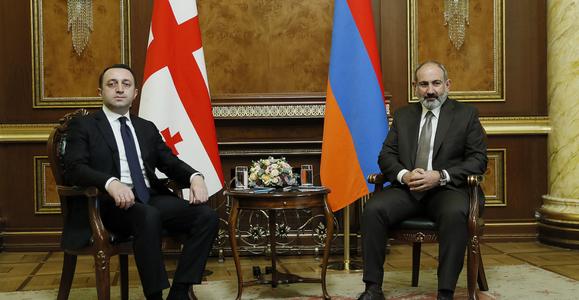
Opinion: Georgia’s mediation moment
Whilst Georgia has long acted as an informal home for peace building initiatives between Armenia and Azerbaijan, its recent offer of its “good offices” shows a higher level of engagement. In this op-ed, Benyamin Poghosyan looks at what's behind this move, for KarabakhSpace.eu.
Ever since the end of the first Karabakh war, Georgia has become a Mecca for meetings of Armenian and Azerbaijani experts, peacebuilders, and other civil society representatives. Buzz words such as Track 2 and Track 1.5 diplomacy in the context of the Karabakh conflict settlement process could be heard very often in hotel conference halls and board rooms in Tbilisi, Bakuriani, Telavi, and other places. Given the apparent obstacles in bringing Azerbaijani experts to Armenia and Armenians to Azerbaijan, many saw Georgia as an ideal place for serious meetings and discussions and long Caucasian-style dinners. Armenians and Azerbaijanis knew Georgia well; logistically, it was pretty easy to reach (1-hour flight from Baku and 30 minutes flight or 5-hour drive from Yerevan). Georgia’s Euro-Atlantic aspirations made it a beloved place for European and American institutions, which organised and funded such meetings. Thus, everyone seemed happy and confident that significant work was going on, if not to solve the Karabakh conflict, at least to prevent a new war.
Even the deteriorating security situation along the line of contact in Karabakh did not raise alarm bells. At least in Armenia, almost everyone was sure that a large-scale war was not possible. Among the most quoted reasons was the perception that neither Russia nor transnational oil and gas companies would allow Azerbaijan to start the war. Another reason behind this iron-clad confidence of Armenians was the belief that President Ilham Aliyev, who during the first Karabakh war was involved in business activities in Moscow and Istanbul, was not ready to command an army. Even the 2016 April “four-day war” did not change this paradigm. At least in Armenia, the war was mainly perceived as an aberration from the ordinary course of events.
Thus, until 27 September 2020, Georgia continued to serve as the primary place for track 2 and track 1.5 Armenia-Azerbaijan diplomacy, bringing experts and representatives of civil society together. Meanwhile, the Georgian government itself never made efforts to portray Georgia as a mediator between Armenia and Azerbaijan. Almost all meetings, workshops, and conferences were organised by different European and American state and private organisations and foundations without any direct involvement of the Georgian state.
The 2020 Karabakh war has, however, significantly changed the geopolitical map and reality of the South Caucasus. Russia and Turkey have increased their roles, and the West was somehow sidelined, while Iran adapted to the new realities. Immediately after the war, there was a pause in track 2 and track 1.5 diplomacy. All participants of the process needed time to adjust to the new situation. Before the war, discussions somehow aligned with the OSCE Minsk Group's suggested solutions known as basic principles and elements. The war changed many things and partly made irrelevant the previously discussed options. Azerbaijan's position – claiming that conflict is over and rejecting even the mere existence of Nagorno-Karabakh – added additional layers of complications.
However, everyone involved in the negotiations process in any capacity – state officials, experts, representatives of civil society, mediators, or facilitators – understand pretty well that sooner or later, negotiations will be resumed. The resumption of official negotiations opens the door to the restart of track 2 and track 1.5 diplomacy. It seemed that Georgia was still perceived as the right place to bring Armenians and Azerbaijanis together. However, in late September 2021 the Georgian government took one step further and announced the launch of the “Peaceful Neighborhood Initiative” to promote stability in the South Caucasus Region. It was the first time Georgia offered its good offices to establish a platform for Armenians and Azerbaijanis to meet and speak. This offer creates a different situation as, before the war, international organisations used Georgian territory without the direct involvement of the Georgian government. Immediately after this announcement, there was speculation to explain the reasons and goals of such a step. Some experts in Armenia believe that Turkey is behind this initiative seeking to decrease the role of the Russia–Armenia–Azerbaijan trilateral format viewing it in the context of Russia–Turkey competition. Some argue that the US is the primary driver as Washington wants to prevent the establishment of the 3+3 (Armenia, Azerbaijan, Georgia, Russia, Iran, Turkey) or 3+2 format (five states minus Georgia) offered by Turkey and Azerbaijan and supported by Russia and Iran.
It is not easy to make a full-fledged assessment regarding the motives behind this Georgian initiative. However, one thing is clear, if Georgia succeeds, it will significantly increase the regional role of Georgia. Given the domestic political instability in Georgia after the return and arrest of former President Saakashvili, the Georgian government needs a foreign policy boost to increase its credentials inside the country and in front of its Western partners. Georgia may serve as a platform not only for Armenia–Azerbaijan but also Armenia–Turkey discussions in track 1, 1.5, and 2 levels. Georgia has no resources to elaborate suggestions for conflict settlement or become a guarantor of the implementation of agreements, but it is well placed in many respects to play a significant role in facilitating dialogue in the South Caucasus.
Source: Benyamin Poghosyan is the Founder and Chairman of the Center for Political and Economic Strategic Studies in Yerevan.
Photo: The prime ministers of Georgia and Armenia, Irakli Garibashvili and Nikol Pashinyan, meet in Yerevan on 9 October 2021; The Office of the Prime Minister of Armenia
The views expressed in opinion pieces and commentaries do not necessarily reflect the position of commonspace.eu or its partners